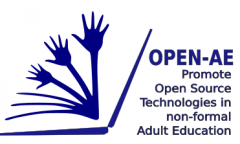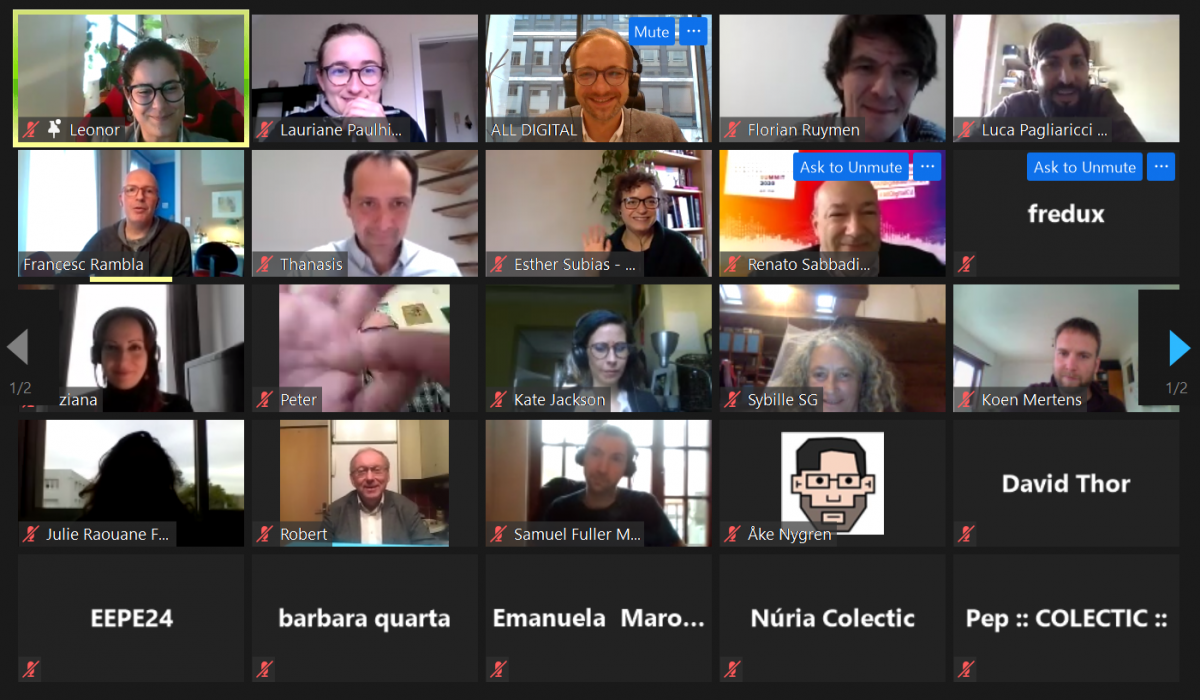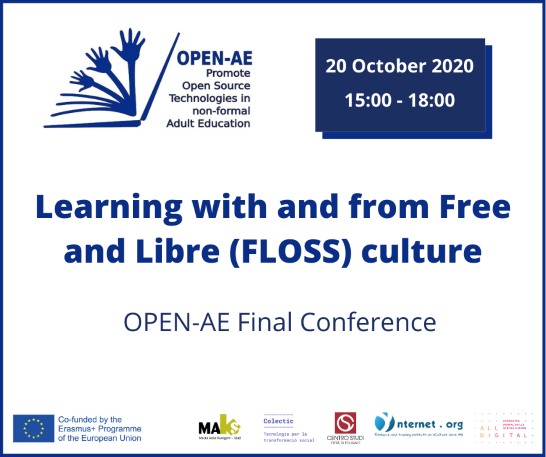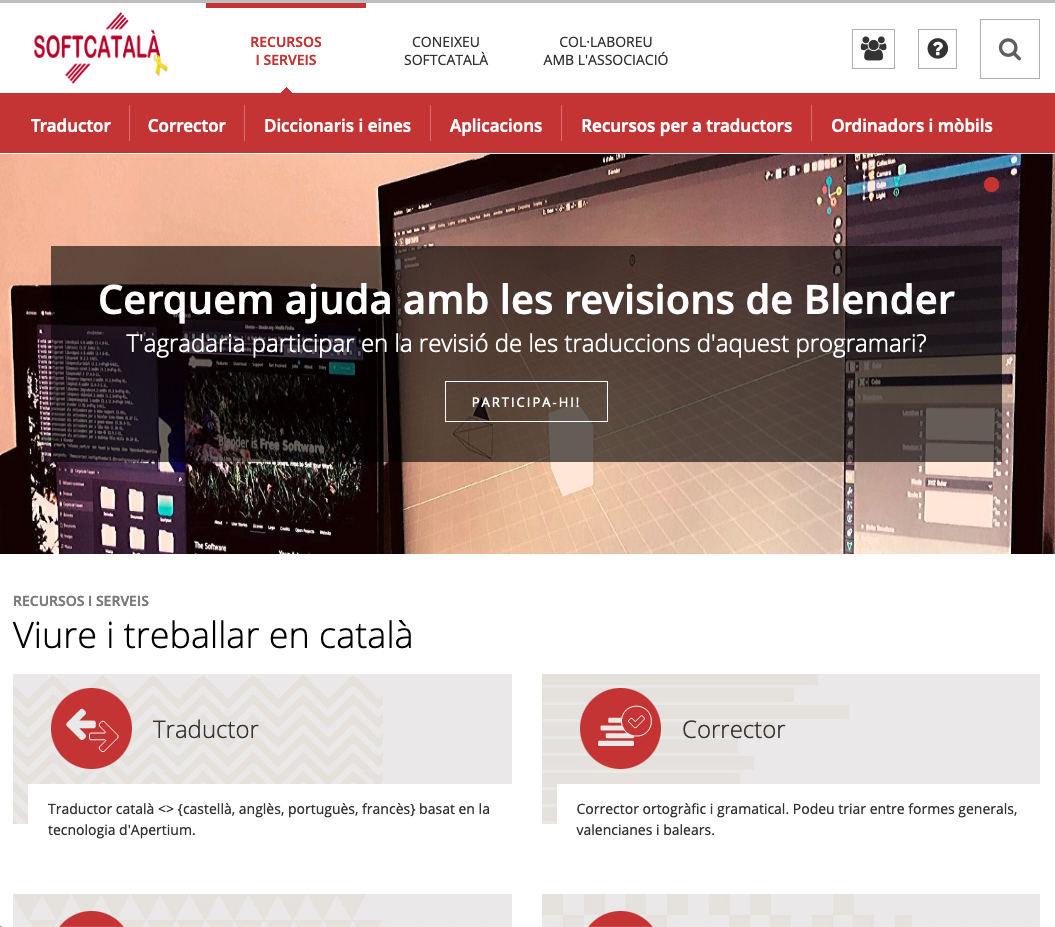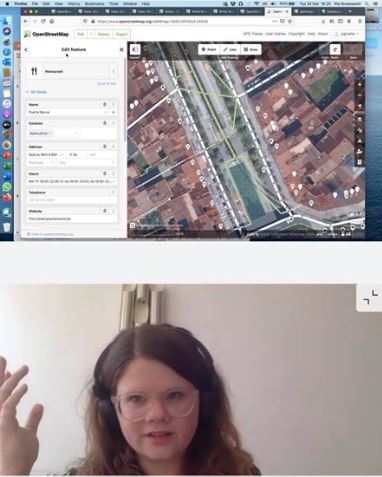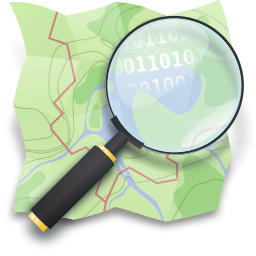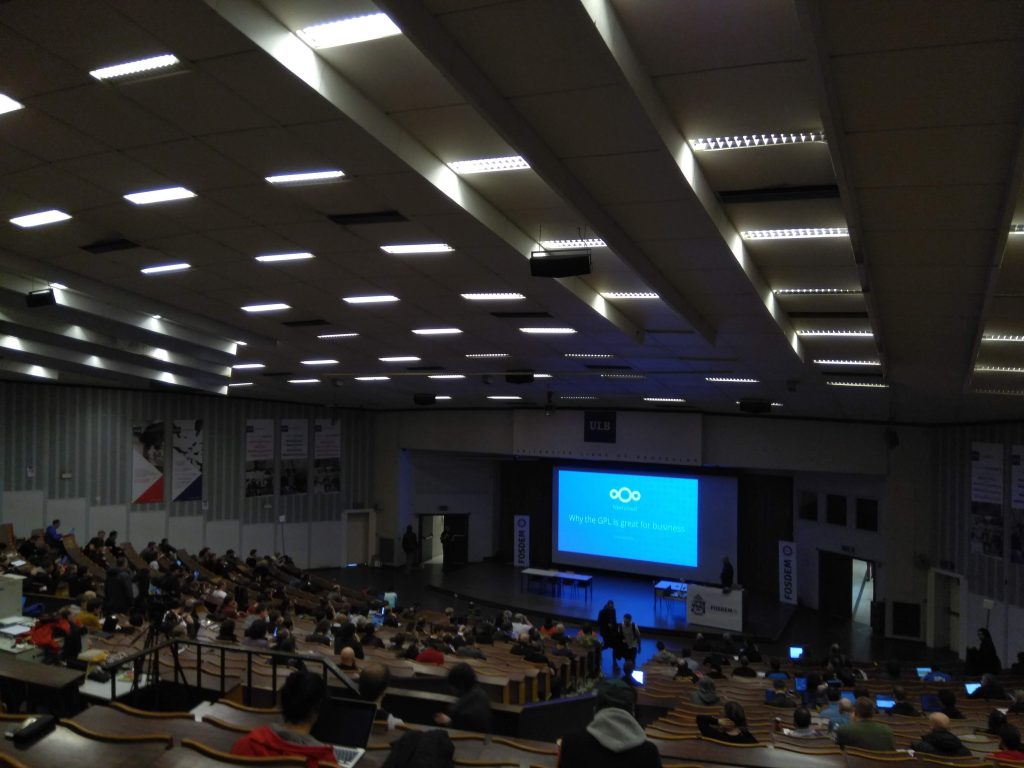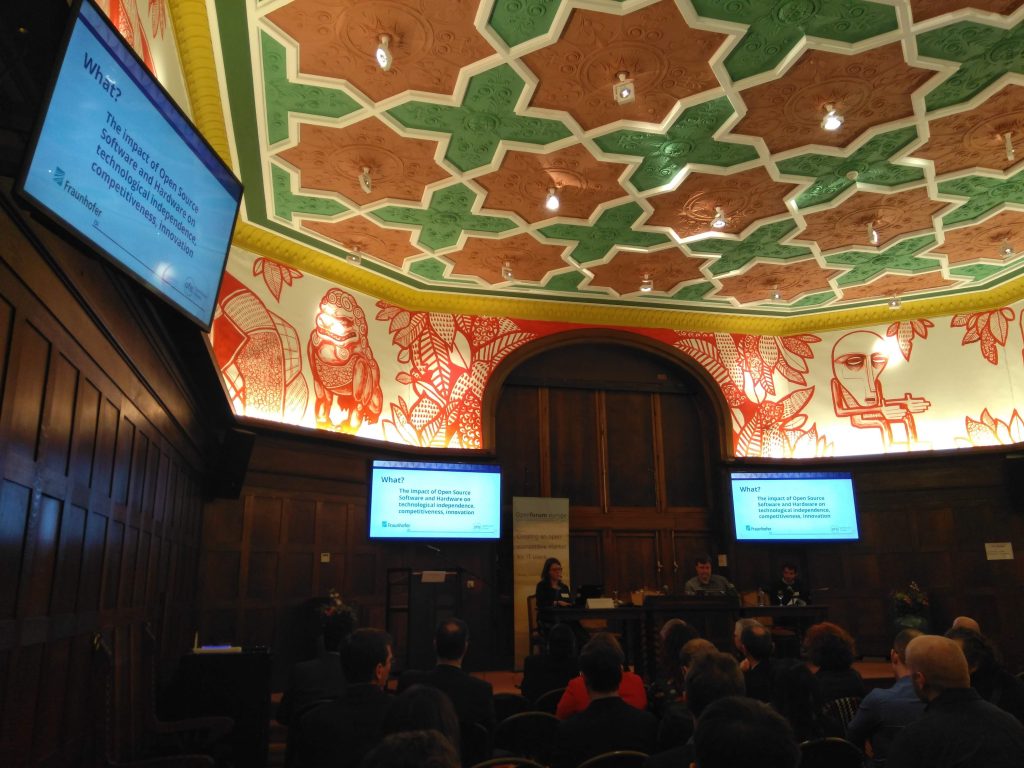One of the last acts of the Open-AE project was the organisations of final multiplier event. Initially planned as a half day event in Brussels where project partners from Italy, Spain, Switzerland and Belgium would meet and present the project results to stakeholders (policy makers and educators inn the field of education and training) in Belgium. Due to COVID-19 pandemics the face-to-face event was moved online.
The event, organized on 20 October, was opened by ALL DIGITAL CEO Renato Sabbadini who in his opening remarks and followed by a panel debate where : Véronique Guisen (CABAN DIBAC, Digital Public Space, Director of the “Saint-Gilles Web Workshops”), Francesc Rambla (Centre de Telecomunicacions i Tecnologies de la Informació), Frédéric Colignon (Popular Digital University, Brussels Linux User Group (BxLUG) and member of ABELLI) and Luca Pagliaricci (Centro Studi Città di Foligno) discussed the use of free and libre (FLOSS) technologies in non-formal adult education. Initial presentations were followed by a discussion among panelists which was moderated by Leonor Afonso from Foundation Ynternet.org. You can watch the panel debate here.
After the panel debate representatives of the project consortium presented the project results. They were accompanied by trainees who participated in the piloting of the Open-AE Curriculum.
Florian Ruymen from MAKS vzw presented Open-AE Analysis Report (watch Florian’s presentation here) which was the starting point of addressing the priorities of the Open-AE project which are:
- to promote access and learning through open educational resources (OER);
- to promote Open Source (OS) technologies in the non-formal educational sector to support the upskilling of adult educators and learners;
- to address adult trainers working in the non-formal educational sector to reinforce digital skills and competences.
The objective of the analysis was to establish a foundation for the development and contextualization of the Open-AE Curriculum and the Open-AE Toolkit, and for the delivery of the training itself providing an adequate contextualization of the expected methods and tools. This was done by (1) desk research (to collect all open educational resources used in non-formal adult education in each of the participating countries and select those that can be used in the implementation of the Open-AE curricula) and (2) field research (done by conducting focus group interviews with 8-10 participants selected from facilitators and training providers in the field of non-formal adult education providers). The analysis from the desk and field research showed poor results in terms of elements directly related to non-formal adult education offers (shortage of trainings for educators, shortage of structured courses exclusively based on open resources, scarce or often missing reference to DigCompEdu etc.) and incredible amount of open resources relevant for the Open-AE project. More detailed explanation of the findings are available in the Analysis report.
Based on the result of the research, and in particular the training needs and area of interest of trainers a preliminary syllabus was drafted to serve as a training scheme to the course curriculum. The following crucial elements for designing the syllabus modules and the linked learning objectives were identified:
- Necessity of a reference to the theoretical and political framework of FOSS technologies and resources to cope with the general lack of awareness;
- Reference to DigCompEdu to support a standardized European framework for trainers upskilling,
- Design of the modules with a direct link to the area of competences trainers believe to be crucial for their job;
- Design of the learning outcomes taking into account the available resources on the field.
Research and analysis enabled setting up a consistent and qualified pedagogical and didactic framework for the development of the Curriculum and Open-AE Toolkit. and design the piloting phase of the project. Check the Open-AE Curriculum here and the list of modules that are included in the Open-AE Course here.
Leonor Afonso from Foundation Ynternet.org presented the Curriculum and Toolkit (watch her presentations here). In the introduction she emphasized that the project partners developed the Curriculum and Toolkit with the learner and learning process in the centre. This was translated to the Open-AE Toolkit which is built in a way that people can contribute to it and can also be responsible for their own learning process. Open-AE Toolkit is a compilation of 18 training scenarios. These scenarios aim to guide trainers and learners during the training period in both the face-to-face classes and online exercises. Together with open educational resources they form an Open-AE Academy platform. The scenarios are available in 6 languages (English, Dutch, French, Italian, Spanish). The Open-AE Academy is complemented by SlideWiki where learning materials (presentations or other) are stored and documented online. SlideWiki is an open-source and open-access platform that employs crowdsourcing methods to support the authoring, sharing, reusing and remixing of open courseware. With the selection of the platforms used for hosting the Toolkit, Open-AE project implements the one of the main principles which is to give learners the power to decide what they want to learn and how.
Esther Subias from Collectic presented the results of Open-AE piloting in Belgium, Italy, Spain and Switzerland (watch her presentation here). The piloting should have been implemented from March to July 2020 through a blended training course, but this was impossible due to COVID-19 pandemic, therefore partners had to transfer all training activities online. Training activities were implemented through various channels and platforms project partners used to establish a support system for learners, create national learning communities and provide access to learning materials and training activities (webinars, video conversations, etc.). Project partners agreed to pilot all of the scenarios. To achieve that divided the scenarios among themselves to make sure all were tested. Participants that participated in the piloting were adult trainers, e-facilitators and also some teachers and IT experts with very different experiences in adult learning (from 3 to 22 years). The length of the piloting course was at least 60 hours. Despite the COVID-19 situation the completion rate of the piloting course among participants was 50%. Every participant that finished the training received a personalized certificate that reflects the content of the training. Difficulties and weaknesses project we detected were: (1) The transformation from blended to online course with very little time for this transformation and (2) Group activities were not as successful as planned due to the experience not being the same in online setting. The feedback from the participants also helped project partners to identify the strengths of the Open-AE training course which are: (1) Well constructed training materials that are relevant to the trainees, (2) Training helped participants to acquire greater understanding of the open source framework and FLOSS culture, (3) Participants didn’t just learn about new tools to develop digital competences but also about communication tools that can be used in online teaching, (4) Creating space and moments for community building was appreciated and proved as a correct strategy. Overall assessment of the piloting is that it was successful as it provides complementary knowledge that advances competences of adult educators in the field of digital skills learning and introduces them to the world of open source technologies and FLOSS culture which enables them to deliver high quality training in non-formal adult education sector. The organisation of the training content and activity provided a great opportunity to create or strengthen an active community around the topic of FLOSS and was also assessed as a fun activity.
Project partners invited trainers and trainees from Belgium, Italy and Switzerland to share their piloting experience with the participants of the final conference. Testimonials were presented by:
- Chiara Borsini (trainer) -> watch her testimony here
- Kate Jackson (trainee) -> watch her testimony here
- Brahim Jerhoum Haissoune (trainee) -> watch his testimony here
Last to speak was Borut Cink from ALL DIGITAL who presented Guidelines for transferability and up scaling of Open-AE project results (watch his presentation here). The document targets policy makers and educators in the field of non-formal adult education and presents the reasoning for mainstreaming and up scaling of open technologies and FLOSS culture to non-formal adult education. Guidelines extrapolated from partners experiences and expertise in the field topped by project results and lessons learned during the project implementation.
